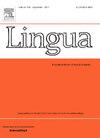英语国家政府会议中的“What the X”:地域分布、情绪和委婉语
IF 1.3
3区 文学
0 LANGUAGE & LINGUISTICS
引用次数: 0
摘要
本文研究了在英语国家的地方政府会议上使用的潜在冒犯性表达,特别是“what the hell”及其委婉变体。两个主要的研究问题:首先,这些表达在国家之间和区域内的频率是否存在显著差异?其次,在情感强度和效价方面,无论是跨国家还是国内,委婉语的替代品与“什么鬼”相比如何?该研究利用了三个最新的大型地理位置自动语音识别(ASR)文本和相应的底层音频语料库的数据,以探索这些表达在不同英语国家(包括美国、加拿大、英国、爱尔兰、澳大利亚和新西兰)的地理分布和情感细微差别。为了评估表情的情绪性,特别是愤怒,我们使用了语音情绪识别模型emotion2vec。研究结果揭示了不同地区对“管他的”及其变体的接受程度和情感分量的差异。此外,该研究还展示了基于向量的语音表示在多模态语料库分析中的潜力,同时从经验上验证了与贬损和委婉语相关的语义理论主张。本文章由计算机程序翻译,如有差异,请以英文原文为准。
‘What the X’ in Anglophone government meetings: Areal distribution, emotionality, and euphemism
This article examines the use of potentially offensive expressions, specifically “what the hell” and its euphemistic variants, in local government meetings across English-speaking countries. Two primary research questions are addressed: first, are there noticeable differences in the frequency of these expressions between countries and within regions? And second, how do euphemistic alternatives compare to “what the hell” in terms of emotional intensity and valence, both across and within national varieties? The study draws on data from three large, recent corpora of geolocated automatic speech recognition (ASR) transcripts and the corresponding underlying audio to explore the geographic distribution and emotional nuances of these expressions in various English-speaking countries, including the US, Canada, the UK, Ireland, Australia, and New Zealand. To assess the emotionality of expressions, specifically anger, the speech emotion recognition model emotion2vec is employed. The findings provide insight into how the acceptability and emotional weight of “what the hell” and variants differ across regions. Additionally, the study demonstrates the potential of vector-based representations of speech in multimodal corpus analysis, while empirically validating theoretical claims in semantics related to pejoration and euphemism.
求助全文
通过发布文献求助,成功后即可免费获取论文全文。
去求助
来源期刊

Lingua
Multiple-
CiteScore
2.50
自引率
9.10%
发文量
93
审稿时长
24 weeks
期刊介绍:
Lingua publishes papers of any length, if justified, as well as review articles surveying developments in the various fields of linguistics, and occasional discussions. A considerable number of pages in each issue are devoted to critical book reviews. Lingua also publishes Lingua Franca articles consisting of provocative exchanges expressing strong opinions on central topics in linguistics; The Decade In articles which are educational articles offering the nonspecialist linguist an overview of a given area of study; and Taking up the Gauntlet special issues composed of a set number of papers examining one set of data and exploring whose theory offers the most insight with a minimal set of assumptions and a maximum of arguments.
 求助内容:
求助内容: 应助结果提醒方式:
应助结果提醒方式:


